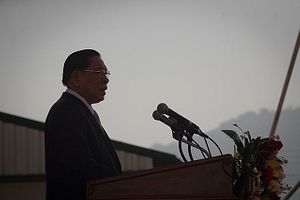This year marks the 60th anniversary of the Lao People’s Revolutionary Party (formerly known as Lao People’s Party), which was founded together with the Indochina Communist Party to expel foreign invaders from Laos, Cambodia, and Vietnam. The struggle for independence finally succeeded in 1975, which led to the establishment of the Lao People’s Democratic Republic.
To celebrate the party’s achievements in the past 60 years, a large gathering of senior party leaders and high-ranking party officials was held at which party secretary-general and president of the Lao PDR Choummaly Sayasone delivered the keynote address.
Choummaly praised the “people’s fighting movement” in leading the Lao multiethnic people during the two-decade campaign for national liberation. He also defined the major victories of the party after 1975: “We were able to heal the wounds of war, restore production, promote culture, and normalize the living conditions” in the country.
He asserted that the party has remained relevant because it adopted the policy of “self-construction and self-improvement to enhance its strength with endless flexibility.” He cited the so-called renovation policy of 1986 which “replaced the bureaucratically centralized economic mechanism and subsidy-based administration with a state-managed market-orientated economy.”
A “state-managed market-orientated economy” sounds like an oxymoron but Choummaly repeated it several times in his speech to emphasize that the party has “liberalized old ways of thinking towards a realistic analysis of the [global] situation” while pursuing socialist directives.
But despite Choummaly’s claim that Lao socialism has led to the empowerment of the people, his speech provided several confirmations about the high poverty rate in the country. For example, he pushed for higher productivity to end poverty in all sectors. “We have to concentrate on alleviating the poverty of local people and graduating from least developed country status and creating a fundamental foundation for our country to move towards socialism,” he said.
He added: “We have to continue to reduce the number of impoverished families to a minimum level and create the necessary infrastructure and facilities for economic development.”
Choummaly rallied his party mates to work for the continued growth of the domestic economy, calling for an average rate of at least 7-8 percent annually until 2020. And the focus of this ambitious economic plan? Choummaly enumerated the country’s expanding sectors with high growth potential such as agriculture and forestry, processing, electricity (hydropower), and transnational tourism. He also mentioned the use of new technology in agriculture and rural development to realize the twin objectives of industrialization and modernization.
Interestingly, Choummaly also spoke of integrating political ideology with the new economic initiatives. “We must view poverty alleviation in association with strengthening political ideology at the grassroots level and comprehensive rural development.”
Perhaps this statement sums up the unique “development destination” that Laos officials are envisioning in the next few years: “The move aims to realize the objective of building up large villages to become small towns in rural areas.”
Choummaly linked the ongoing integration of the diverse economies of Southeast Asian nations with the forces of change that influence the nation’s development. He warned of “new disputes,” which he said should be decisively addressed by the new generation of party leaders.
This is probably why he diligently discussed organizational concepts such as “centrally based democratic principle” and “team-based leadership principle” after advocating for greater competitiveness and market reforms in the economy.
It may not have been the intention, but Choummaly’s speech offered a succinct overview of socialism, Laos style.
































